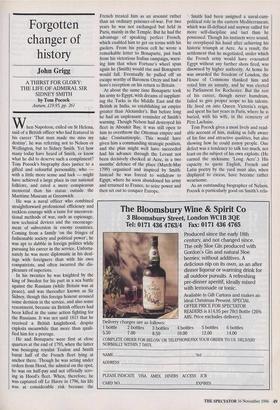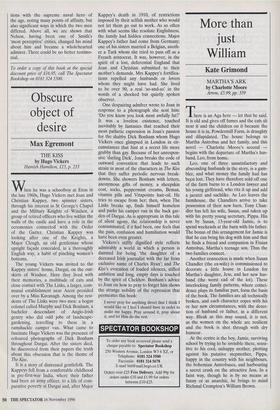Forgotten changer of history
John Grigg
A THIRST FOR GLORY: THE LIFE OF ADMIRAL SIR SIDNEY SMITH by Tom Pocock Aurum, £19.95, pp. 261 When Napoleon, exiled on St Helena, said of a British officer who had featured in his career 'That man made me miss my destiny', he was referring not to Nelson or Wellington, but to Sidney Smith. Yet how many today have heard of Smith, or know what he did to deserve such a compliment? Tom Pocock's biography does justice to a gifted and colourful personality, who with a little more sense and luck — might have achieved a large place in our national folklore, and rated a more conspicuous memorial than his statue outside the Maritime Museum at Greenwich.
He was a naval officer who combined straightforward professional efficiency and reckless courage with a taste for unconven- tional methods of war, such as espionage, new technical devices and the encourage- ment of subversion in enemy countries. Coming from a family 'on the fringes of fashionable society and political power', he was apt to dabble in foreign politics while pursuing his career in the service. Unfortu- nately he was more diplomatic in his deal- ings with foreigners than with his own compatriots, and often incurred the dis- pleasure of superiors.
In his twenties he was knighted by the king of Sweden for his part in a sea battle against the Russians (while Britain was at peace), and was thereafter known as Sir Sidney, though this foreign honour aroused some derision in the service, and also some resentment, because six British officers had been killed in the same action fighting for the Russians. It was not until 1815 that he received a British knighthood, despite exploits meanwhile that more than quali- fied him for a peerage.
He and Bonaparte were first at close quarters at the end of 1793, when the latter was besieging royalist Toulon and Smith burnt half of the French fleet lying at anchor there. Though he was acting under orders from Hood, the admiral on the spot, he was on half-pay and not officially serv- ing in Hood's fleet. When, therefore, he was captured off Le Havre in 1796, his life was at considerable risk because the French treated him as an arsonist rather than an ordinary prisoner-of-war. For two years he was not exchanged but held in Paris, mainly in the Temple. But he had the advantage of speaking perfect French, which enabled him to get on terms with his gaolers. From his prison cell he wrote a remarkable letter to Bonaparte, just back from his victorious Italian campaign, warn- ing him that when Fortune's wheel spun again he (Smith) would rise and Bonaparte would fall. Eventually he pulled off an escape worthy of Baroness Orczy and had a hero's reception on his return to Britain.
At about the same time Bonaparte took his army to Egypt, with dreams of supplant- ing the Turks in the Middle East and the British in India, so establishing an empire greater than Alexander's. But before long he had an unpleasant reminder of Smith's warning. Though Nelson had destroyed his fleet in Aboukir Bay, it was still open to him to overthrow the Ottoman empire and take Constantinople. This would have given him a commanding strategic position, and the plan might well have succeeded had his advance through the Levant not been decisively checked at Acre, in a two months' defence of the place (March-May 1799) organised and inspired by Smith. Instead he was forced to withdraw to Egypt, where he soon abandoned his army and returned to France, to seize power and then set out to conquer Europe. Smith had been assigned a naval-cum- political role in the eastern Mediterranean, which was ill-defined and anyway called for more self-discipline and tact than he possessed. Though his instincts were sound, he overplayed his hand after achieving his historic triumph at Acre. As a result, the settlement that he negotiated, under which the French army would have evacuated Egypt without any further shots fired, was disowned by higher authority. At home he was awarded the freedom of London, the House of Commons thanked him and voted him an annuity, and he was elected to Parliament for Rochester. But the rest of his career, though never humdrum, failed to give proper scope to his talents. He lived on into Queen Victoria's reign, and spent his last years in Paris, where he is buried, with his wife, in the cemetery of Pere Lachaise.
Tom Pocock gives a most lively and read- able account of him, making us fully aware of his fine and attractive qualities, but also showing how he could annoy people. One defect was a tendency to talk too much, not least on the subject of his own exploits. (He earned the nickname 'Long Acre'.) His capacity to quote English, French and Latin poetry by the yard must also, when displayed to excess, have become rather wearisome.
As an outstanding biographer of Nelson, Pocock is particularly good on Smith's rela- tions with the supreme naval hero of the age, noting many points of affinity, but also significant ways in which the two men differed. Above all, we are shown that Nelson, having been one of Smith's `most perceptive' critics, changed his mind about him and became a wholehearted admirer. There could be no better testimo- nial.
To order a copy of this book at the special discount price of £16.95, call The Spectator Bookshop on 0181 324 5500.



















































































 Previous page
Previous page